'Enough food, problem is distribution': Greater Vancouver Food Bank trades harvests with counterparts in Regina
The two provincial agencies have exchanged about 40 tonnes of surplus food, sharing their provincial bounty with neighbours to try to get food into the hands of people who need it
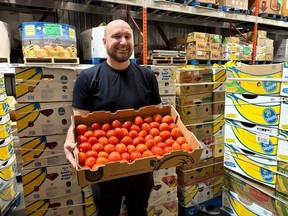
Article content
B.C. tomatoes for Saskatchewan lentils? It’s a trade.
There may be trade wars and tit-for-tat tariffs internationally, but the Greater Vancouver Food Bank and the Regina Food Bank are giving a lesson in interprovincial trade done right.
The two agencies have exchanged about 40 tonnes of surplus food, sharing their provincial bounty with neighbours to try to get food into the hands of people who need it the most.
Greater Vancouver Food Bank CEO David Long said the alliance was sparked by conversations he had with John Bailey, his Regina counterpart, about the amount of surplus food they have.
“I came up with a crazy idea of exchanging as much food as possible in a 53-foot truck, and, through the connections we have, it all has come together in a very cool way,” said Long.
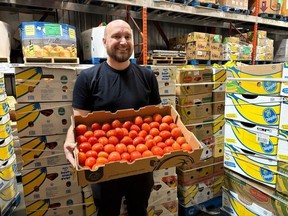
Last week, the Greater Vancouver Food Bank loaded more than 45,000 pounds of fresh carrots, zucchinis, potatoes and tomatoes from B.C. farms into a truck that made the two-day trek across Western Canada.
When the truck arrived in Regina, the West Coast produce was unloaded and replaced with 45,000 pounds of made-in-Saskatchewan products that the Prairie province has in abundance, like oats, grains, lentils and other pulses.
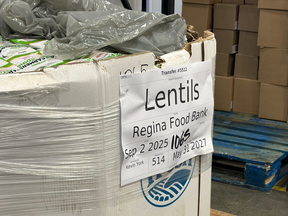
“In total, we moved 40 tonnes of surplus food across the country,” said Long. “And hopefully this is just the start of it.”
Long believes the cross-provincial exchange could be one of the ways to address hunger in Canadian cities and give clients a more varied and nutritious diet. There’s no shortage of food, just a distribution problem, said Long, who joked that he makes this assertion so frequently that it’ll be the epitaph of his tombstone.
“We have enough food. We just need a better way to move it around.”
He said the average farmer produces 10 to 15 per cent more food than they need to fulfil grocery orders. They grow extra because what they need to sell to stores need to be cosmetically appealing, so a lot of the surplus food goes to waste.
According to a Business Development Bank of Canada report, about 20 per cent, or 11 million tonnes, of food produced in Canada each year end up in landfills, producing greenhouse gases, which one estimate has pegged at producing more than 25 million metric tonnes a year, the equivalent of more than 253,000 one-way flights from Toronto to Vancouver.
In 2017, in an effort to curb food waste, the B.C. government began offering a tax credit to farmers who donate their extra food to registered charities. Since then, the Greater Vancouver Food Bank has seen a boost in donations of fresh produce, which goes to 16,000 clients weekly and to 160 other agencies in Metro Vancouver, Whistler and the Okanagan.
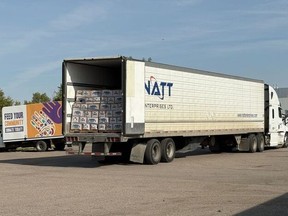
Long said the exchange with Saskatchewan is the first time that the charity moved fresh produce across provinces.
Transporting perishables is tricky, but they were able to do it with the help of CDS Ltd., a local transportation and warehousing company, at cost for $6,000.
And the cherry on top, said Long, is that the food bank was able to pay for freight costs using money it had raised from another recent initiative: Turning surplus mandarin oranges and apples that would otherwise end up in the landfill into fresh juice sold at three Loblaw stores in Vancouver and North Vancouver.
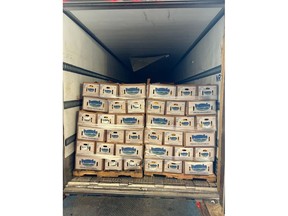
That initiative, which started two months ago, raised $8,000 in revenue in the first month on shelves. Long said that program will continue into the fall and winter, using whatever surplus fruits are in season or are available.
He also hopes the B.C. and Saskatchewan trade was the first of many to come.
“Absolutely we’ll do it again,” he said. “We want to move more food to more areas. There’s lots of opportunities out there … we just wanted to prove it can be done.”















Postmedia is committed to maintaining a lively but civil forum for discussion. Please keep comments relevant and respectful. Comments may take up to an hour to appear on the site. You will receive an email if there is a reply to your comment, an update to a thread you follow or if a user you follow comments. Visit our Community Guidelines for more information.